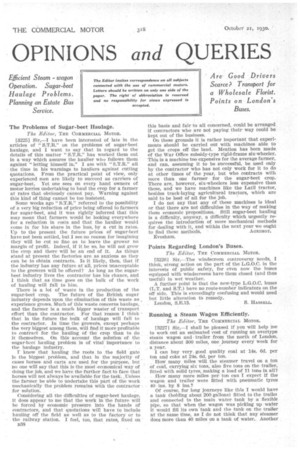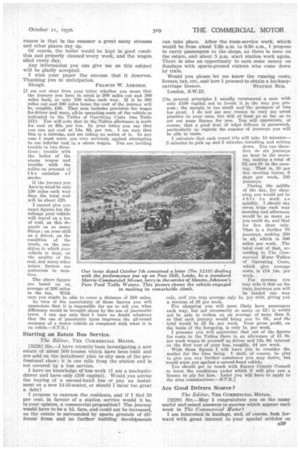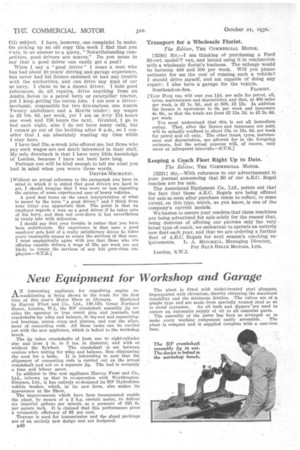OPINIONS and QUERIES The Problems of Sugar-beet Haulage.
Page 64

Page 65

Page 66

If you've noticed an error in this article please click here to report it so we can fix it.
The Editor, THE COMMERCIAL MOTOR.
[3225] Sir,—I have been interested of late in the articles of " S.T.R." on the problems of sugar-beet haulage, and I want to say that in regard to the details of this matter " S.T.R." has worked them out in a way which assures the haulier who follows them against "letting himself in." I am with " S.T.R." all the time in his warnings to hauliers against cutting quotations. From the practical point of view, only experienced men are likely to succeed as carriers of sugar-beet. Yet one sees on every hand owners of motor lorries undertaking to haul the crop for a farmer at rates that obviously cannot pay. Warning against this kind of thing cannot be too insistent.
Some weeks ago " S.T.R." referred to the possibility of a very big reduction of price being offered to farmers for sugar-beet, and it was rightly inferred that this may mean that farmers would be looking everywhere for a reduction in costs and that the haulier would come in for his share in the loss, by a cut in rates.
Up to the present the future prices of sugar-beet have not been settled, but I see no reason for imagining they will be cut so fine as to leave the grower no margin of profit. Indeed, if it be so, he will not grow the crop and there will be an end of it. As things stand at present the factories are as anxious as they can be to obtain contracts. Is it likely, then, that if the industry has any future at all, prices unacceptable to the growers will be offered? As long as the sugarbeet industry lives the contractor has his chance, and 1 think that as time goes on the bulk of the work of hauling will fall to him.
There is a lot of waste in the production of the sugar-beet crop. The future of the British sugar industry depends upon the elimination of this waste as .• experience grows. Much of this waste concerns haulage, and the farmer is a much bigger waster of transport effort than the contractor. For that reason I think that in the future the bulk of haulage will fall to the contractor. In time the growers, except perhaps the very biggest among them, will find it more profitable to contract for the hauling of the crop than to do it themselves. On this account the solution of the sugar-beet hauling problem is of vital importance to the haulage industry.
T know that hauling the roots to the field gate is the biggest .problem, and that in the majority of
cases horsesand carts are used for the purpose, but
DO one will say that this is the most •economical way of doing the job, and we have the further fact to face that
horses will not always be available for the task. Unless the farmer be able to undertake this part of the work mechanically the problem remains with the contractor for solution.
Considering all the difficulties of sugar-beet haulage, it does appear to me that the work in the future will be forced by economic pressure into the hands of contractors, and that quotations will have to include hauling off the field as well as to the factory or to the railway station. I feel, too, that rates, fixed on 1338
this basis and fair to all concerned, could be arranged if contractors who are not paying theirway could be kept out of the business.
On these grounds it is rather important that experiments should be carried out with machines able to get the crops off the land. Mention has been made of the War Office subsidy-type rigid-frame six-wheeler. This is a machine too expensive for the average farmer, and can, assuming it to be successful, be used only by the contractor who has not only work for it to do at other times of the year, but who contracts with
more than one farmer for the sugar-beet crop.There are, however, six-wheelers less expensive than
these, and we have machines like the Lath l tractor, besides track-laying agricultural tractors, which are said to be best of all for the job.
I do not say that any of these machines is ideal or that there are not difficulties in the way of making them economic propositions. Still sugar-beet hauling is a difficulty, anyway, a difficulty which urgently requires the introduction of more mechanical methods for dealing with it, and within the next year we ought to find these methods. AGEIMOT. Evesham.
Points Regarding London's Buses.
The Editor, THE COMMERCIAL MOTOR.
[3226] Sir,—The windscreen controversy needs, I think, strong action on the part of the L.G.O.C. in the interests of public safety, for eVen now the buses equipped with windscreens have them closed (and thus useful) in wet weather.
A further point is that the new-type L.G.O.C. buses (L.T. and S.T.) have no route-number indicators on the off side. This is exceedingly confusing and would need but little alteration to remedy.
London, S.E.13. S. HASSELL.
Running a Steam Wagon Efficiently.
The Editor, THE COMMERCIAL MOTOR.
[3227] Sir,—I shall be pleased if you will help me to work out an estimated cost of running an overtype steam wagon and trailer from the north of London, distance about 300 miles, one journey every week for a year.
I can buy verygood quality coal at 14s. 6d. per ton and coke at 24s. 6d. per ton.
How many miles will the steamer travel on a ton of coal, carrying six tons, also five tons on the trailer, fitted with solid tyres, making a load of 11 tons in all?
How many more miles per ton can I expect if the wagon and trailer were fitted with pneumatic tyres 40 ins. by 8 ins.?
Of course, for long journeys like this I would have a tank (holding about 200 gallons) fitted to the trailei and connected to the main water tank by a flexible pipe, so that when the wagon was picking up water it would fill its own tank and the tank on the trailer at the same time, as I do not think that any steamer does more than 40 miles on a tank of water. Another reason is that in the summer a great many streams and other places dry up. • Of course, the boiler would be kept in good condition and properly cleaned 'every week,. and. the wagon oiled every day.
Any information you can give me on this subject wilt be gladly accepted.
I wish your paper the success that it deserves. Thanking you in anticipation.
Slough. FRANCISW. ADDISON.
[I am not clear from your letter whether you mean that the journey you have in mind. is 300miles out and 30& miles back, or ouly 150 miles each way. IT it be 300 miles out and 300 miles home the cost of the journey will be, roughly, £30. That sum. includes provision for wages fin-driver and mate, all-in operating costs of the vehicle as indicated in the Tables of Operating Costs (see Table III). You will note that in the Tables allowanee is made for coal at 458. per tom In your letter you say that y-ou can get coal at 14s. 6(1. per ton I am sure that this is a mistake, and am taking no notice of it. In any case I must warn you very seriously against attempting to use inferior coal in a steam wagon. Yon are inviting trouble in two dimetions ; trouble with the boiler of the steamwagon and trouble with the police on account of the emission o f" smoke.
If the journey you have in mina be only 150 miles each way then the total cost will be about £20.
I cannot give you exact figures for the mileage your vehicle will travel on a ton of coal, as this de-, pends on so many things: on your skid as a driver, on the condition of the roads, on the condition in which your vehicle is kept, on the quality of the coal, and many other minor factors . too numerous to mention.
The above figures are based on an average of 200miles
to the ton. With • care you might be able to cover a distance of 250 miles.
In view of the uncertainty of these figures you will appreciate that it is impossible for me to tell you. what difference would be brought about by the use of pneumatic tyres. I can say only that I have no doubt whatever that the use of pneumatic tyres improvesthe all-round economy of a motor vehicleas compared with what it is on solids,—ST,R.}
Starting an Estate Bus Service.
The Editor, TEE COMMERCIAL MOTOR.
[3228] Sir,—I have recently been investigating a new estate of about 500 houses which have been' built and are sold on the instalment plan to city men of the professional class ; it is one mile from the station and is not covered by a bus service. • I have no knowledge of 'bus work (I am a mechanicdriver and have only £100 capital). Would you advise the buying of a second-hand bus or pay an instalment on a new 14-16-seater, or should I incur too great a debt?
propose to canvass the residents, and if I find 50 per cent. in favour of a station service would it be, in your opinion, a commercial proposition? The journey -would have to. be a Id. fare, and could not be increased, as the estate is surrounded by sports grounds of different firms and no farther building: devekipments can take place: After the train-service work, which. would be from about 7.30. a.m. to 9.34 a.m., I propose to carry passengers to the. shops,. as there is none on the estate,and' about 5 p.m. start station work again-. There is also. an opportunity to earn some money on Sundays with sports-ground visitors who come down by train.
Would you please let me know the running costs; licence, tax, etc., and how I proceed to obtain a hackney
carriage licence: STATION Bus. London, S.W.15.
[On generalprinciples I usually recommend a man with only £100 capital not to invest it in the way you propose; the margin is too small and the prospect of loss too great. I do not see any reason to vary my usual practice in your case, but will at least go so far as to set out some figures for you. You will appreciate, of course, that a good deal of what follows is guesswork, Particularly as regards the number of journeys you will
be able to make. •
I calculate that each round trip will take 10 minutes5 minutes to. pick up and 5 minutes travelling and setting down. You can therefore do sin journeys an hour in the morning, making a total of 12; and 18 in the evening. That is, 30 per day meeting trains, 6 days per week, 180 journeys.
During the Middle of the day, for shopping, you would not be able to work so
scielivieenklyt.ripIs sehaocuhl vsraayy morning and afternoon would he as many .as you could do, and that for five days only. That is a further 70 journeys, making 250 in all, which is 500 miles per week. The total cost of that, according, to The Commercial Motor Tables of Operating Costs, which give average costs, is £14 14s, per week.
For revenue you may take it that on the train journeys you will be loaded one way
only, and you may average only Is. per mile, giving you a revenue of £9 per week.
'For shopping you will most likely have passengers
each way, but not necessarily so many as 12 would not be safe to reckon on an average of more than 9; so that each journey would bring. you in 6d., and the total would be £5 5s. per week. Your gross profit, on the basisof the foregoing, is only 1s. per. .week.
I presume you will appreciate that out of the figures for costsin the Tables there is an allowance of £3 68. per week wages to yourself as driver and 13s. 9d. interest on the first cost of your bus, roughly, £4 per week.
With these figures I will leave you to consider the matter for the time being. I shall,, of course, be glad to give you any further assistance you. may desire, but would warn you against a second-hand vehicle.
You should get in touch with Surrey County Council .to learn the conditions under which it will give you a licence to ply for hire. Later you will have to apply to the Area commissioner.—S.T.R.J
Are Good Drivers Scarce ?
The Editor, THE COMMERCIAL MOTOR.
[3229] Sir,—May I congratulate you on the many useful and sound answers-to queries which appear each week in The Commercial Motor?
1 am interested in haulage, and of course, look forward with great interest to. your special articles on
thiz subject. I have, however, one complaint lo make. On picking up an old copy this week I find that you state, in an answer to a query, "Notwithstanding competition, good drivers are scarce." Do you mean to say that a good driver can easily get a post?
When I say a "good driver" I mean a man who has had about 10 years' ,driving and garage experience, has never had his licence endorsed or had any trouble with the authorities, and can drive any kind of car or lorry. I claim to be a decent driver. I hold good references, do all repairs, drive anything from an Austin Seven to a petrol lorry or caterpillar tractor, yet I keep getting the rotten jobs. I am now a drivermechanic, responsible for two fire-engines, one Austin Twenty ambulance and a Morris tender; my wages is £3 10s. fid. per week, yet I am on duly 154 hours one week and 158 hours the next. Granted, I go to bed each night, also I do not have many calls, but I cannot go out of the building after 9 p.m., so I consider that I am absolutely wasting my time while 1 stay here.
I have had 35s.-a-week jobs offered me, but firms who pay such wages are not much interested in their staff. My only drawback is that I have very little knowledge of London, because I have not been here long.
Perhaps you will be kind enough, to tell me what you had in mind when you wrote those words.
DRIVER-MECHANIC.
[Without an actual reference to the paragraph you have in mind in which it is stated that good drivers are ,hard to get, I should imagine that I was more or less repeating the opinion of some experienced user of heavy vehicles.
A good deal turns on the exact interpretation of what is meant by the term "a good driver," and I think from your letter you appreciate that. The point is that an employer regards a man as a good driver if he takes care of his lorry, and does not over-drive it but nevertheless is rarely late with deliveries.
I should say that your trouble is rather that you have been unfortunate. My experience is that once a good employer gets hold of a really satisfactory driver he takes every reasonable means to retain the services of that man. I most emphatically agree with you that those who are offeringcapable drivers a wage of 35s. per week are not likely to retain the services of any but poor-class employees.—S.T.R.]
Transport for a Wholesale Florist.
Th,e Editor, THE COMMERCIAL MOTOR.
[3230] Sir,—I am thinking of purchasing a Ford 30-cwt. model-T van, and intend using it in conjunction with a wholesale florist's business. The mileage would be between 400 and 500 per week. Will you please estimate for me the cost of running such a vehicle? I should drive myself, and am capable of doing any repair; I also have a garage for the vehicle.
Southend-on-Sea. FLORIST.
[Your Ford van will cost you lid. per mile for petrol, oil, tyres, maintenance and depreciation and that, at 400 miles per week, is £2 is. 8d., and at 500, £2 12s. In addition the licence is equivalent to 6s. per week and insurance 4s. ed., so that the totals are from £2 13s. 2d. to £3 2s. 6d. per week.
You must understand that this is not all immediate outlay. That, after the licence and insurance are paid, will be actually confined to about 15s. to 18s. 6d. per week for petrol and oil only. The other items, tyres, maintenance and depreciation, are allowed for in the foregoing estimate., but the actual expense will, of course, only recur at infrequent intervals.—S.T.11.]
Keeping a Coach Fleet Right Up to Date.
The Editor, THE COMMERCIAL MOTOR.
[32311 Sir,—With reference to our advertisement in your journal announcing that 30 of our A.E.C. Regal coaches are for sale.
The Associated Equipment Co., Ltd., points out that the fact that these A.E.C. Regals are being offered for sale so soon after purchase tends to reflect, to some extent, on this type, which, as you know, is one of the company's current models.
We hasten to assure your readers that these machines are being advertised for sale solely for the reason that, being desirous of offering our patrons only the very latest type of coach, we endeavour to operate an entirely new fleet each year, and that we are ordering a further fleet of A.E.C. Regale for next season's coaching retluirements. L. A. MITCHELL, Managing Director, For BLUE BELLE MOTORS, LTD. London, S.W.2.




















































































































